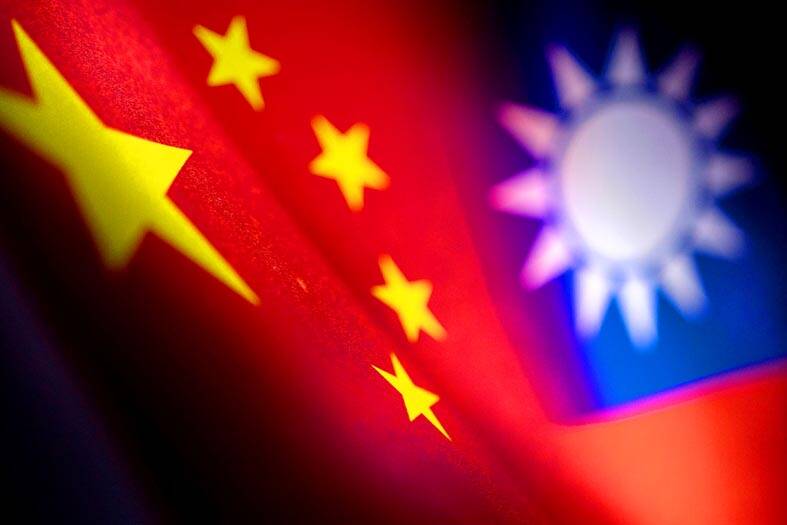Beijing’s insistence that its so-called “one China principle” is a prerequisite for Taiwan’s participation in APEC activities is a serious violation of the organization’s norms and practices, the Ministry of Foreign Affairs (MOFA) said yesterday.
The ministry reiterated that Taiwan, as an official member of APEC, shares equal participation rights with other member economies.
The APEC grouping is one of the few international bodies Taiwan is a member of, although it takes part as “Chinese Taipei” to avoid political problems and its president never attends.

Photo: Reuters
Next year’s summit is scheduled to take place in Shenzhen, China, in November.
On Saturday, MOFA official Jonathan Sun (孫儉元) said in South Korea at the end of this year’s summit that China had provided written assurances last year about the safety of all participants at next year’s summit.
In a written statement to Reuters, the Chinese Ministry of Foreign Affairs said there were no worries.
“As the host of APEC in 2026, China will fulfil its host-country obligations in accordance with APEC rules and customary practice, and there will be no issue with all parties participating smoothly,” it said.
“We would like to emphasize that the key to Chinese Taipei’s participation in APEC activities lies in compliance with the ‘one China’ principle and the relevant APEC memorandum of understanding, rather than any safety issues,” it said.
Speaking in Taipei on Monday after returning from South Korea, Sun said Taiwan had already asked China last year whether it would receive “equal treatment” and expressed concerns about its people’s safety.
Other “like-minded partners” had similar worries, he added.
“We hope everyone can urge the Chinese side to fulfil their promises to ensure to safety of all the participants and equal participation of the economies, not only Taiwan,” he said.
“At the joint request of our country and like-minded nations, China explicitly guaranteed in writing last year that it would ensure the personal safety of all economic participants and facilitate their smooth entry and exit to attend meetings in China,” MOFA said in a statement yesterday.
The joint statement from the bilateral ministerial meetings last year and this year clearly included the statement that “all economies should have equal participation in all APEC meetings, including the leaders’ meetings,” it said.
Taiwan “sternly demands that the Chinese side must honor its commitments and, in accordance with APEC rules and practices, ensure Taiwan’s equal, dignified and safe participation in all APEC meetings and activities held in China next year,” MOFA said.
“It must safeguard the personal safety of our delegates,” it added. “We will not accept any political maneuver aimed at diminishing or excluding Taiwan’s participation, and we will resolutely counter such actions in cooperation with like-minded partners.”
The last time China hosted an APEC summit, in 2014, relations with Taiwan were much better under then-president Ma Ying-jeou (馬英九), who signed landmark trade and tourism deals with Beijing.
However, in 2001, Taiwan boycotted the APEC summit in China after a disagreement over who it could send.

MAKING WAVES: China’s maritime militia could become a nontraditional threat in war, clogging up shipping lanes to prevent US or Japanese intervention, a report said About 1,900 Chinese ships flying flags of convenience and fishing vessels that participated in China’s military exercises around Taiwan last month and in January have been listed for monitoring, Coast Guard Administration (CGA) Deputy Director-General Hsieh Ching-chin (謝慶欽) said yesterday. Following amendments to the Commercial Port Act (商港法) and the Law of Ships (船舶法) last month, the CGA can designate possible berthing areas or deny ports of call for vessels suspected of loitering around areas where undersea cables can be accessed, Oceans Affairs Council Minister Kuan Bi-ling (管碧玲) said. The list of suspected ships, originally 300, had risen to about 1,900 as

Japan’s strategic alliance with the US would collapse if Tokyo were to turn away from a conflict in Taiwan, Japanese Prime Minister Sanae Takaichi said yesterday, but distanced herself from previous comments that suggested a possible military response in such an event. Takaichi expressed her latest views on a nationally broadcast TV program late on Monday, where an opposition party leader criticized her for igniting tensions with China with the earlier remarks. Ties between Japan and China have sunk to the worst level in years after Takaichi said in November that a hypothetical Chinese attack on Taiwan could bring about a Japanese

MORE RESPONSIBILITY: Draftees would be expected to fight alongside professional soldiers, likely requiring the transformation of some training brigades into combat units The armed forces are to start incorporating new conscripts into combined arms brigades this year to enhance combat readiness, the Executive Yuan’s latest policy report said. The new policy would affect Taiwanese men entering the military for their compulsory service, which was extended to one year under reforms by then-president Tsai Ing-wen (蔡英文) in 2022. The conscripts would be trained to operate machine guns, uncrewed aerial vehicles, anti-tank guided missile launchers and Stinger air defense systems, the report said, adding that the basic training would be lengthened to eight weeks. After basic training, conscripts would be sorted into infantry battalions that would take

DEEP-STRIKE CAPABILITY: The scenario simulated a PLA drill that turned into an assault on Taiwan’s critical infrastructure, with the launchers providing fire support Taiwan yesterday conducted this year’s first military exercises at Longsiang Base in Taichung, demonstrating the newly acquired High Mobility Artillery Rocket System’s (HIMARS) ability to provide fire support and deep-strike capabilities. The scenario simulated an attack on Penghu County, with HIMARS trucks immediately rolling into designated launch areas and firing barrages at the Wangan (望安) and Cimei (七美) islands, simulating the provision of fire support against invading forces. The HIMARS are supposed to “fire and leave,” which would significantly increase personnel and equipment survivability, a military official said. The drill simulated an exercise launched by the Chinese People’s Liberation Army (PLA) Eastern